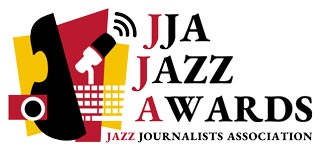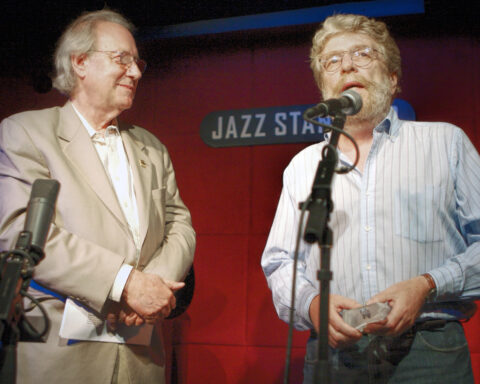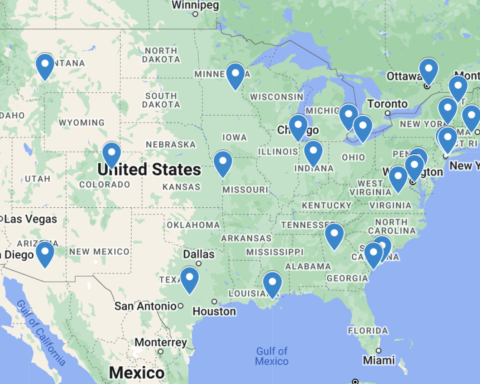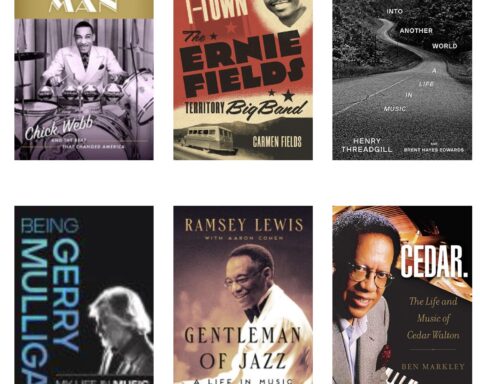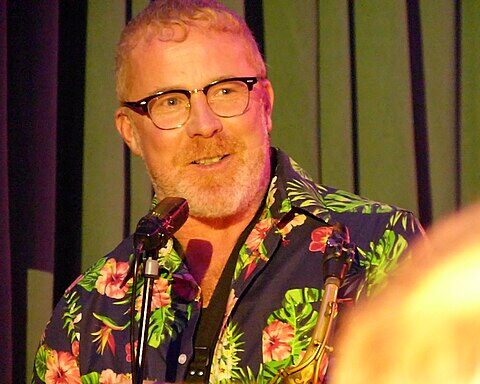Ed. note: The accumulated experience and vast contacts of the JJA’s membership are the organization’s greatest assets. In the column Meet-A-Member read some of our stories.

F. Norman Vickers has been celebrated as a 2021 JJA Jazz Hero; see his profile here. He’s also recently been featured in Coming of Age magazine, interviewed on WUWF-FM as well as on on local ABC affiliate WCOA-TV3 in a weekly segment titled “Angels in Our Midst.”
Stirrings of interest in starting a jazz society in Pensacola, FL was begun in the 1960s with jazz enthusiasts and some jazz musicians, but it was decided that it would require too much work.
However, in 1982, the University of West Florida’s new radio station had begun broadcasting and jazz was part of its stated mission. Pensacola Arts Council had just been organized. So I invited Pat Crawford, WUWF-FM director, and Arts Council director Diane Magie (pronounced Magee) to my home after a musical event at our local Pensacola Junior College.
I suggested that Pensacola needed a jazz festival. Crawford was in favor. If Ms. Magie had been an experienced executive director, likely she would have responded, “Good idea. I’ll present it to my board.” Instead, she responded, “Great idea; let’s do it!”
That was the impetus necessary to begin organizing a jazz society. The idea was that Arts Council would be the lead organization with the University radio station and the newly formed jazz society in support positions.
Local saxophonist and bandleader Joe Occhipinti had been doing a Friday Jazz at Noon event at a

the Gulf Coast Ethnic & Heritage Jazz Festival Hall of Fame — photo © Gregg Pachkowski
local restaurant, so approximately 100 known jazz enthusiasts were invited to attend the 2 p.m. meeting after the music ended. Approximately 40 persons attended and enthusiastically endorsed the idea. We planned to have annual membership dues and make a reasonable charge for our jazz events.
Details for organizing The Jazz Society of Pensacola, Inc. as a legal not-for-profit entity were proceeding at the same time as plans for our first Pensacola JazzFest to be presented in the spring of 1983. Letters went out to approximately 40 known jazz organizations asking for advice about how best to proceed. The response was enthusiastic. The two best pieces of advice were:
- Rest assured that a small number in your organization will do most of the work.
- Don’t depend on the musicians to make your organization succeed; they have another agenda.
The Jazz Society organization moved along smoothly. A board of five was elected. It was planned that one member would retire and one new director would be elected each year. Staggered terms for board members were initiated to make the process work.
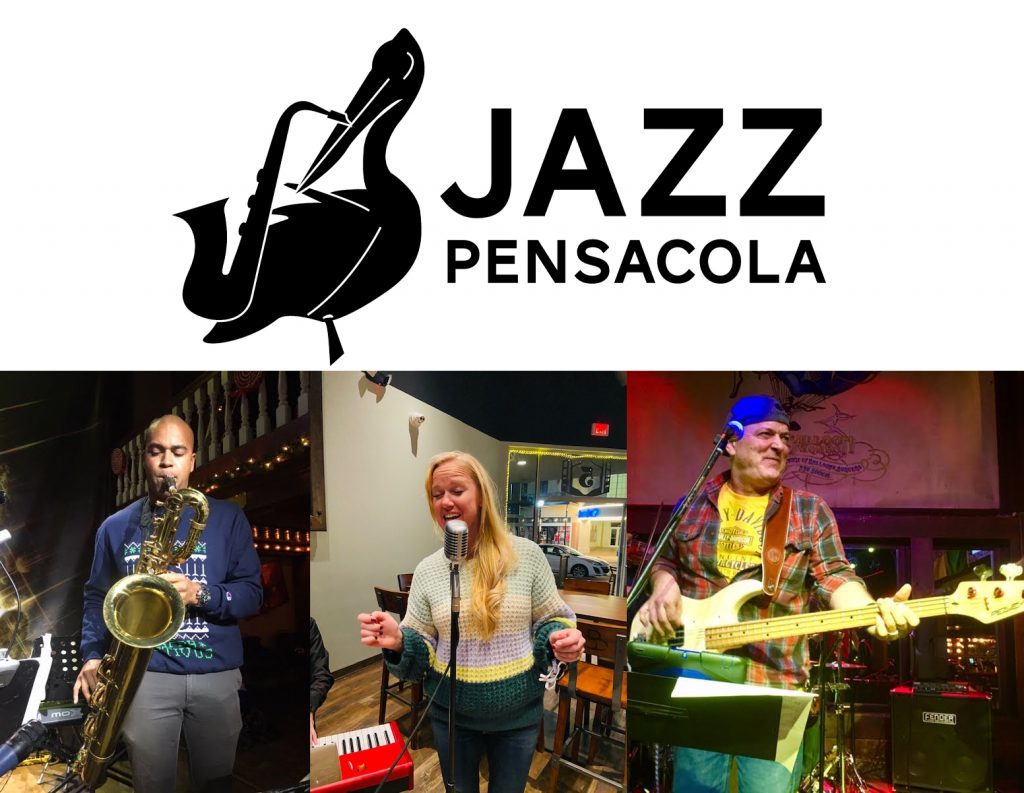
My election was for three years. The Jazz Society would operate from my medical office, so our main office expenses were merely office supplies, stamps, etc. The joke in the community was that when one called to speak with Dr. Vickers, the question was, “ Is it musical or medical?”
The first Pensacola JazzFest was held in the spring of 1983 with Pensacola Arts Council as primary sponsor and WUWF-FM and Jazz Society of Pensacola as support. It was held in downtown’s historic, shaded Seville Square.
About the same time as our local jazz society was getting started, there was a movement to have a national jazz organization. JazzTimes magazine was holding a convention in New York City. Some of the prime movers in that get-together were Warren Vache, Sr., of New Jersey Jazz Society,
Harold Gray of Potomac River Jazz Club and Hal Davis, newly retired New York publicist who had just moved to Sarasota with view to starting a jazz society there. I attended the JazzTimes event and, as a bonus, sat in the hotel room with these jazz elders to witness the beginning of American Federation of Jazz Societies (AFJS).
The following year, the first AFJS convention was held in Savannah, GA and I was elected to the board of directors. Because initially the AFJS board was heavily weighted toward the East Coast, I dropped off the board and was re-elected a few years later when the AFJS convention was held in New Orleans.
The AFJS Board was dynamic, to say the least. Usually, board members had been effective with their local societies as president, newsletter editor or in other responsible jobs. Board meetings were usually held with other jazz events — this is all pre-Internet, remember — so for example I had opportunity to visit Sacramento Jazz Jubilee and attend an AFJS board meeting there on the trip. However, everyone traveled at their own expense.

photo from JazzTimes
One AFJS activist
who deserves special mention is the late Mat Domber, founder of Arbors Records.
Mat sponsored some excellent jazz parties in Clearwater, FL. AFJS sponsored Statesmen of Jazz, a group of musicians each over 50 years old. The question of liability insurance came up and Domber volunteered that his company would be responsible for liability insurance for that group.
Special mention, too, should be to Bill Gottlieb. He was jazz photographer for Washington Post late 1930s to 1948, except for a couple of years off to be in military service during WWII. Also a prolific producer of educational filmstrips and early supporter of the Jazz Journalists Association, Bill was a board member after he’d retired from the publishing industry and was enjoying

photo: Library of Congress
touring the world with his jazz photography exhibits. We became good friends, discussing our mutual interests.
Harold Gray of Potomac River Jazz Club was best AFJS president during my time. He was lobbyist for independent grocers, independent truckers and so on. He’d assign me a job and then call about ten days later to inquire how it was going. Typically I hadn’t done anything, and he suspected as much. But I’d promise to get on it and would do so in order to avoid embarrassment when he was due to call about 10 days later.
My own year as president of AFJS happened by default. In 1991, pianist Ed Metz, Sr. was due to be president. He had just retired from an industrial position. He also was bandleader in New Jersey. He had just successfully contracted with the Bob Crosby family to use the Bob Crosby name for his band, and so announced that he would be unable to accept the presidency. Hence, Vickers got the job!
I had been editor of our quarterly newsletter, and continued that job during my presidency of AFSJ since it was easier just to do it than to find someone to whom to hand it off. But the highlight of my year as AFJS President came in spring of 1991.
Our convention was in Kansas City and new marble slab gravestones had been installed on the graves of Charlie “Bird” Parker and his mother. These were to replace the small gravestones which had been stolen from the gravesite. Local plans were to have a 21-sax salute on a Sunday morning when the gravestones were to be dedicated. The AFJS board was in attendance, as were radio and television representatives — but not a single saxophonist showed up.
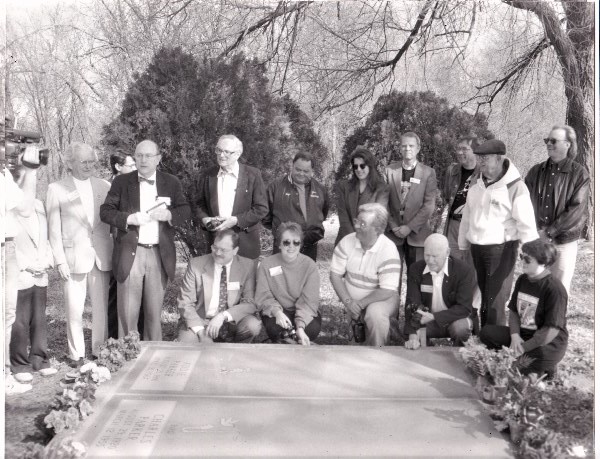
So I took out my three-octave chromatic harmonica and played a 48-reed salute on a Charlie Parker tune. I never got to see the tv coverage on the Sunday evening news, as I was on my way back to Pensacola to be ready for Monday morning medical practice!
As readers may know, AFJS died a death of attrition in the early 2000s after a 20-year run. Individual societies reduced their support — shortsightedly, in my view — by withdrawing their financial contributions.
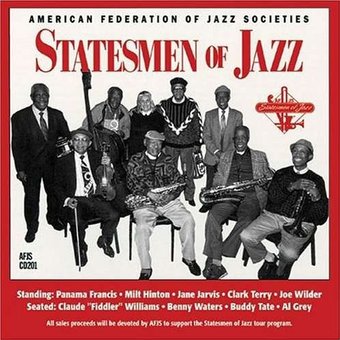
Although AFJS expenses were minimal, there were costs of producing a newsletter and paying certain office expenses. During that period a series of manuals were produced and consultative help was made available to individual societies. We organized and produced the all-star Statesmen of Jazz, who released an album on Arbors Records.
To my knowledge, no similar umbrella group has arisen to connect the existing societies, institutes and every-year more diverse non-profit music support associations. Although Jazz Education Network is an effective organization for its constituency, it does not speak to the unique needs of jazz societies. An unmet need exists.
Back to Jazz Pensacola — shorter name for Jazz Society of Pensacola, Inc. In 1996, preparing for eventual retirement from medical practice, I sold my practice to our local Baptist Hospital. Nothing materially changed in the practice, but I could no longer justify using medical staff for part-time jazz work. Consequently, we found an affordable office and hired a part-time administrator. In approximately 2004 I stepped down at Volunteer Executive Director. The board has currently governed successfully with help of a part-time administrator Alice Crann Good.
In 1999, Jazz Pensacola assumed direction of Pensacola JazzFest after administration by the Arts Council for seven years and WUWF-FM radio for 10 years, respectively. Hence, Jazz Pensacola has run our JazzFest longer than the previous two responsible groups.
We have missed two years of producing it: in 1997 when WUWF had moved the JazzFest to fall from it’s usual spring date, then announced they ending sponsorship, not leaving time for spring 1998 planning. The other was spring 2020 when Covid-19 shut down many activities.

Happily, our 2021 free Pensacola JazzFest was held in mid-May with good music and good crowds. Because national artists were still unsettled about traveling of long-term commitments, acts were drawn from local and regional groups, thereby saving some travel and hotel expenses.
Outlook is good for Jazz Pensacola as we resume our monthly jazz programs and our separate monthly jazz jams. We continue our support of an annual jazz scholarship competition for high school and college jazz students., Also, we have an endowment fund for visiting jazz artists. Guitarist Gene Bertoncini as a visiting jazz artist gave a jazz class for guitar students from University of West Florida and Pensacola State College, a public jazz concert at PSC and a fundraising concert for Jazz Pensacola. Funds are reserved for a repeat of the visiting artist program. Our board and entire membership are enthusiastic about the future!

